Many in the food industry seem surprised at the positive nature of talks at the summit – though questions about inflation remain unanswered
The Downing Street garden has witnessed some infamous moments in recent times. This week’s gathering was less controversial but just as significant, as PM Rishi Sunak brought together industry representatives in the hope of pressing the reset button on food and drink in the UK.
With the Conservatives floundering in the polls, Sunak faces outrage from farmers who claim they have been let down on the promises of Brexit, while they – and consumers – face rampant inflation.
So the stakes could not have been higher on Tuesday when the PM met more than 70 businesses and a small army of trade body bosses for crisis talks.
But did the ‘Sunak Summit’ sprout any fresh ideas, and will it mend the government’s relationship with industry?
Few knew exactly what to expect when they arrived at 9.30am on Tuesday to be escorted to an outdoor area, lined with stalls from British producers.
Also there to greet them was a raft of government ministers, not to mention two members of the cast of Jeremy Clarkson’s farming reality show, Kaleb Cooper and ‘cheerful’ Charlie Ireland – though Clarkson himself was a no-show.
Among more established industry guests were Morrisons CEO David Potts and M&S Food MD Alex Freudmann.
Sources noted a united display between environment secretary Thérèse Coffey and NFU boss Minette Batters, apparently unshaken by the former having been booed at the union’s conference in February after denying food shortages were a sign of market failure.
Pre-event mingling lasted around an hour, fuelling widely expressed doubts this was any more than a PR stunt, though one source points out “there were lots of ministers floating around and the sun was out, so everybody was happy”, at least on the surface.
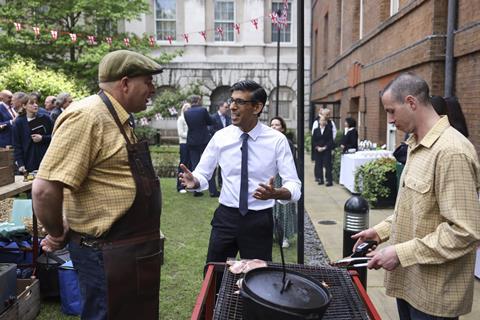
Direct approach
Yet there was a mixture of expectation and trepidation as Sunak finally brought the crowd to attention to deliver his address.
What followed, according to one source, was a speech short on time, but notable for a direct approach, in stark contrast to the bluster of Sunak’s predecessor Boris Johnson.
“It was a blink-and-you-miss-it speech,” says one source. “But Sunak was very clear in his message.”
With the overriding point being that the government was on the side of British farmers and “here to listen”, the PM set specific commitments that any future trade deals penned by the Tories would rule out the importing of chlorinated chicken and hormone-treated beef.
It was part of a list of polices, some new, others cobbled together from ongoing consultations, that the PM unveiled for the summit (see box, right).
After Sunak’s 10-minute address, attendees broke off into four different workshops.
Sunak’s summit pledges
- At least 45,000 seasonal workers for horticulture in 2024 (plus 2,000 for poultry), an uplift of 15,000 compared with the start of 2022, with the potential for 10,000 more visas
- Reviews beginning in the autumn in the eggs and horticulture sectors
- £12m to support research projects on environmental sustainability and resilience on farms
- £30m to unlock the potential of precision breeding
- Replacement for Fruit & Vegetables Aid Scheme for England from 2026
- Plans to fold Groceries Code Adjudicator into CMA scrapped
Source: 10 Downing St
Discussions in these included setting out plans to export “great British food” to the world (talks headed by export minister Malcolm Offord and former FDF boss Ian Wright, now co-chair of the Food & Drink Exports Council).
Ensuring resilient and transparent food chains “from farm to fork” was left to Coffey and Batters, despite the previous ‘car crash’ conference events.
Meanwhile environment minister Mark Spencer led a discussion on sustainability, while Defra minister Richard Benyon focused on boosting innovation in the farming and food sector.
Yet one glaring admission, according to several sources at the event, was the lack of discussion on food inflation.
“There was some talk of the prices that farmers can get, but there was no big discussion over what to do to tackle inflation, which was a shock,” says one source.
There was also no concrete news over whether the government will listen to industry calls for a bonfire of regulations, with landmark policies such as Extended Producer Responsibility and DRS, among those most in their sights.
“There are going to be some very big calls ahead for Sunak and Coffey,” says one attendee. “On the one hand, shelving EPR or DRS or both is going to be very controversial, but if they don’t the result could be catastrophic and surely the last thing the government wants given its dire situation in the polls is more chaos.
FDF CEO Karen Betts describes the talks as “constructive” but says the industry now needs concrete action to remove the burden of regulation.
“It’s a pity there wasn’t more of a laser focus on immediate issues and the drivers of inflation,” she says. “While some of these are beyond everyone’s control, many are not.
“It’s critical that government takes the time to ensure that their draft regulation on packaging recycling in particular will actually work. The current design is likely to drive further and avoidable costs into food businesses, which will add to the cost of everyone’s weekly shop, just as prices should be starting to come down.”
Yet farming minister Spencer insists the mood after the event was “buoyant”.
“There was a lot of common ground,” he says. “It was about addressing some of those challenges and working out how we co-operate together to solve those challenges.”
Challenges don’t come much bigger than images of empty shelves, and despite Defra having previously played down the extent of food shortages, Spencer admits it has struggled to maintain consumer and industry confidence.
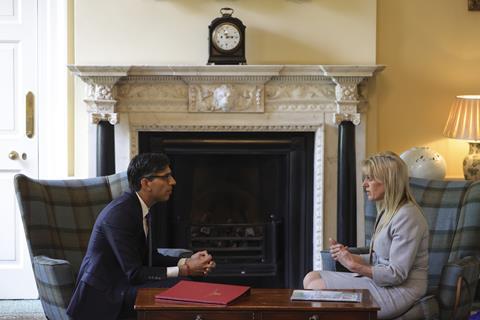
“It’s so difficult, to be dead straight with you. If I go out tomorrow and say ‘don’t worry there is no problem with potatoes’, by tomorrow morning there will be empty shelves on the potato aisle, because the second you say there is not a problem, people think there is a problem.
“Clearly there was a challenge with tomatoes, cucumbers and peppers, with snow in Morocco and Spain in January, but for a minister to come out and say ‘there is a huge problem over here’ would have made it worse.
“So you have to try and work with the sector behind the scenes to mitigate impact and try and stop it from happening in the future.”
A better mood
With one source claiming that before the summit expectations of progress were “subterranean”, the heavy presence of ministers – as well as Sunak’s clear, if brief, message on trade deals – does appear to have lifted the mood, at least temporarily.
“It was actually really good,” says Arla UK MD Ash Amirahmadi. “Defra got themselves organised and the cabinet showed up. [Grant Shapps and Victoria Prentis were among others present.]
“The meeting exceeded expectations, and kudos to the NFU and Minette for lobbying the PM for the meeting.”
British Poultry Council CEO Richard Griffiths says it is vital ministers press ahead with the package of measures and continue the constructive dialogue.
“Today has been a crucial first step. We must now ensure this doesn’t pivot into a sidestep around the big issues we are waiting for more detail on.
A source adds: “I spoke to one minister on the way in to No 10 and asked what he expected. He said this is about having a reset after the clusterf*** that was the Boris Johnson era.”
Yet with Johnson hovering in the background and Keir Starmer hot favourite to soon be tending the No 10 roses, it’s going to be extremely hard for Sunak to make the reset count, as he heads off for his next summit, the G7 in Japan.







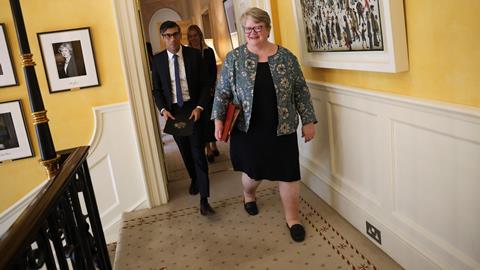
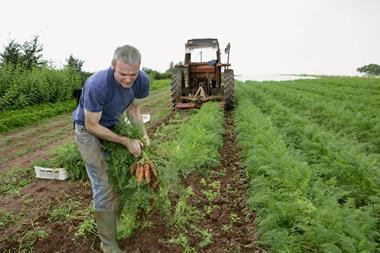
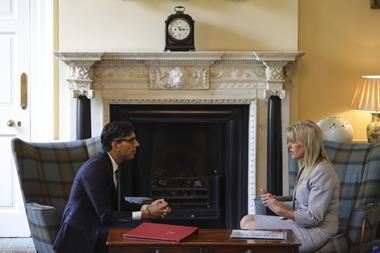
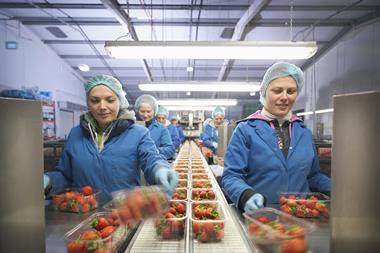
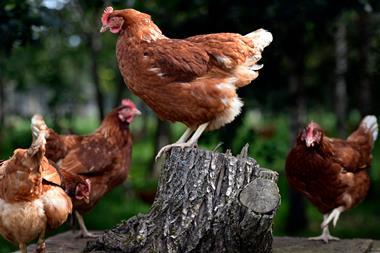
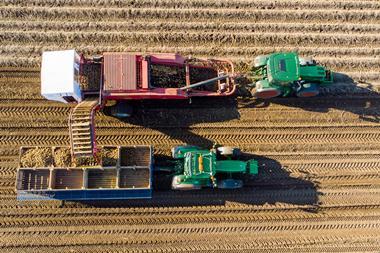
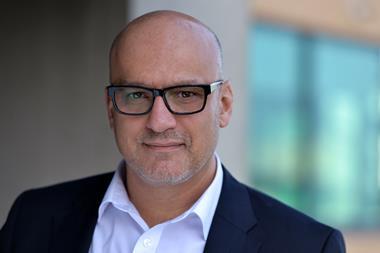






No comments yet